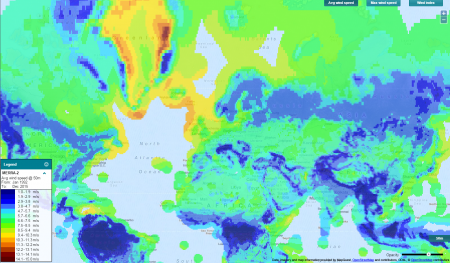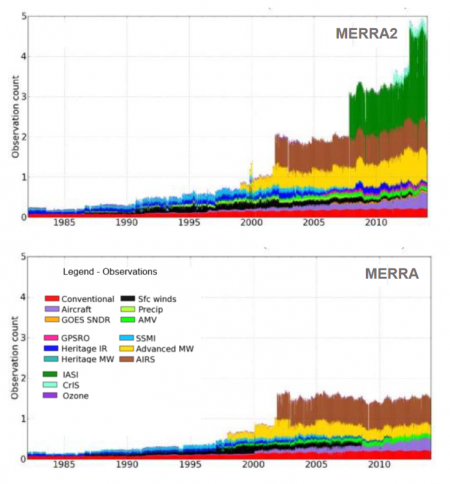Difference between revisions of "MERRA-2 Data"
m (→External Links) |
|||
| (16 intermediate revisions by 2 users not shown) | |||
| Line 3: | Line 3: | ||
[[File:MERRA-MERRA2.png|450px|right|thumb|Observations assimilated in MERRA2 (top) and MERRA (bottom) datasets for the period 01.1980 until 12.2014. Units are millions per 6 hours. From Bosilovich et al.]] | [[File:MERRA-MERRA2.png|450px|right|thumb|Observations assimilated in MERRA2 (top) and MERRA (bottom) datasets for the period 01.1980 until 12.2014. Units are millions per 6 hours. From Bosilovich et al.]] | ||
== Introduction == | == Introduction == | ||
| − | MERRA-2 is the recent version of the popular MERRA dataset modelled and distributed by the Global Modeling and Assimilation Office of NASA / Goddard Space Flight Center. The original [[MERRA_Data|MERRA]] dataset is discontinued in early 2016. After this point MERRA-2 is the most recent and updated MERRA dataset. MERRA-2 uses a newer version of the modelling system and also incorporates newer data sources and observations. | + | MERRA-2 is the most recent version of the popular MERRA dataset modelled and distributed by the Global Modeling and Assimilation Office of NASA / Goddard Space Flight Center. The original [[MERRA_Data|MERRA]] dataset is discontinued in early 2016. After this point MERRA-2 is the most recent and updated MERRA dataset. MERRA-2 uses a newer version of the modelling system and also incorporates newer data sources and observations (see the lower-figure to the right). |
At EMD, we have done a comprehensive evaluation of the performance of the MERRA2 dataset for wind-energy applications. Please consult the paper by Thøgersen et al, "''Is MERRA2 Able to Replace MERRA as a Trusted Reference Wind Dataset?''". The paper is available from the windPRO knowledgebase, [https://help.emd.dk/knowledgebase/content/ReferenceManual/MERRA2.pdf here]. | At EMD, we have done a comprehensive evaluation of the performance of the MERRA2 dataset for wind-energy applications. Please consult the paper by Thøgersen et al, "''Is MERRA2 Able to Replace MERRA as a Trusted Reference Wind Dataset?''". The paper is available from the windPRO knowledgebase, [https://help.emd.dk/knowledgebase/content/ReferenceManual/MERRA2.pdf here]. | ||
| Line 11: | Line 11: | ||
* '''Spatial Resolution:''' | * '''Spatial Resolution:''' | ||
** 0.5 degree latitude | ** 0.5 degree latitude | ||
| − | ** 0.625 degree | + | ** 0.625 degree longitude |
* '''Temporal Resolution:''' Hourly values. | * '''Temporal Resolution:''' Hourly values. | ||
* '''Coverage:''' | * '''Coverage:''' | ||
| Line 18: | Line 18: | ||
* '''Period:''' 25+ years. The EMD databases will hold data back to 1992. | * '''Period:''' 25+ years. The EMD databases will hold data back to 1992. | ||
* '''Update schedule:''' | * '''Update schedule:''' | ||
| − | ** EMD updates the dataset once a month - with data being | + | ** EMD updates the dataset once a month - with data being available with a 1-2 month delay from real-time due to NASA/MERRA data availability. |
== Usage Notes and User Notifications == | == Usage Notes and User Notifications == | ||
| − | '''2020-11-03:''' NASA has notified us about an issue with the September 2020 data (released from NASA on October 20th 2020). The MERRA-2 science team at NASA do not recommend using the data - and are currently reprocessing the data. In the windPRO online-data services, September 2020 data has now been removed as of November 3rd. If you have downloaded the MERRA-2 data in the period between October 24th to November 3rd, we recommend that you disable or remove the MERRA2-data for the month of September 2020. The actual nature of the issue is unknown to the windPRO online-data team. We will send out a notification when new data has been released from NASA. Read the original statement from NASA [https://help.emd.dk/mediawiki/images/a/a1/20201103_MERRA2-Notification.pdf here]. | + | '''2020-11-05:''' NASA has released a revised MERRA-2 dataset covering the month of September 2020. This revised data is released with windPRO on November 6th 2020. It is confirmed that the 50m wind-speeds are affected, see our map that visualizes the difference between the two batches of data - [https://help.emd.dk/mediawiki/images/7/7d/DeltaWindSpeedsMERRA2_September2020.pdf here]. We have also a plot that visualizes the time-series differences in 50m wind speed for a single node at location N56.0 E9.4, [https://help.emd.dk/mediawiki/images/3/3a/MERRA2_September2020-Issue-SingleNode-GoodVsBad.pdf here]. If you have downloaded the September 2020 data in the period from October 24th to November 3rd, we recommend that you: 1) Delete the month of September 2020. 2) Download the most recent data. 3) Re-do your calculations. Read the final newsletter about this issue [https://www.emd.dk/newsletters/windpro/windPRO3.4_MERRA2_2020-09_Update.html here]<br> |
| + | '''2020-11-03:''' NASA has notified us about an issue with the September 2020 data (released from NASA on October 20th 2020). The MERRA-2 science team at NASA do not recommend using the data - and are currently reprocessing the data. In the windPRO online-data services, September 2020 data has now been removed as of November 3rd. If you have downloaded the MERRA-2 data in the period between October 24th to November 3rd, we recommend that you disable or remove the MERRA2-data for the month of September 2020. The actual nature of the issue is unknown to the windPRO online-data team. We will send out a notification when new data has been released from NASA. Read the original statement from NASA [https://help.emd.dk/mediawiki/images/a/a1/20201103_MERRA2-Notification.pdf here]. Read the windPRO newsletter about this issue, [https://www.emd.dk/newsLetter/590f7275-f092-47aa-a79f-2fd5b7f3940b/newsletters/windpro/windPRO3.4_MERRA2_2020-09.html here]. | ||
== Data Availability == | == Data Availability == | ||
| Line 77: | Line 78: | ||
== External Links and References == | == External Links and References == | ||
| − | * The MERRA-2 project page - [ | + | * The MERRA-2 project page - [https://gmao.gsfc.nasa.gov/reanalysis/MERRA-2/ HERE] |
| − | * Bosilovich et al "''MERRA-2: Initial Evaluation of the Climate''" - [ | + | * Bosilovich et al "''MERRA-2: Initial Evaluation of the Climate''" - [https://gmao.gsfc.nasa.gov/pubs/docs/Bosilovich803.pdf HERE] |
| − | * Thøgersen et al, "''Is MERRA2 Able to Replace MERRA as a Trusted Reference Wind Dataset?''" - [ | + | * Thøgersen et al, "''Is MERRA2 Able to Replace MERRA as a Trusted Reference Wind Dataset?''" - [https://help.emd.dk/knowledgebase/content/ReferenceManual/MERRA2.pdf HERE]. |
== Acknowledgement == | == Acknowledgement == | ||
Credits: The Global Modeling and Assimilation Office (GMAO) for the MERRA-analysis and the GES DISC for the dissemination of MERRA. | Credits: The Global Modeling and Assimilation Office (GMAO) for the MERRA-analysis and the GES DISC for the dissemination of MERRA. | ||
Revision as of 10:33, 6 November 2020

Introduction
MERRA-2 is the most recent version of the popular MERRA dataset modelled and distributed by the Global Modeling and Assimilation Office of NASA / Goddard Space Flight Center. The original MERRA dataset is discontinued in early 2016. After this point MERRA-2 is the most recent and updated MERRA dataset. MERRA-2 uses a newer version of the modelling system and also incorporates newer data sources and observations (see the lower-figure to the right).
At EMD, we have done a comprehensive evaluation of the performance of the MERRA2 dataset for wind-energy applications. Please consult the paper by Thøgersen et al, "Is MERRA2 Able to Replace MERRA as a Trusted Reference Wind Dataset?". The paper is available from the windPRO knowledgebase, here.
Dataset Overview
- Content:: Renewable energy focused data subset of MERRA2 data.
- Spatial Resolution:
- 0.5 degree latitude
- 0.625 degree longitude
- Temporal Resolution: Hourly values.
- Coverage:
- Coverage is global for land-areas and coastal regions.
- In windPRO, offshore coverage is at a distance of approximately 300 km from any known coastlines.
- Period: 25+ years. The EMD databases will hold data back to 1992.
- Update schedule:
- EMD updates the dataset once a month - with data being available with a 1-2 month delay from real-time due to NASA/MERRA data availability.
Usage Notes and User Notifications
2020-11-05: NASA has released a revised MERRA-2 dataset covering the month of September 2020. This revised data is released with windPRO on November 6th 2020. It is confirmed that the 50m wind-speeds are affected, see our map that visualizes the difference between the two batches of data - here. We have also a plot that visualizes the time-series differences in 50m wind speed for a single node at location N56.0 E9.4, here. If you have downloaded the September 2020 data in the period from October 24th to November 3rd, we recommend that you: 1) Delete the month of September 2020. 2) Download the most recent data. 3) Re-do your calculations. Read the final newsletter about this issue here
2020-11-03: NASA has notified us about an issue with the September 2020 data (released from NASA on October 20th 2020). The MERRA-2 science team at NASA do not recommend using the data - and are currently reprocessing the data. In the windPRO online-data services, September 2020 data has now been removed as of November 3rd. If you have downloaded the MERRA-2 data in the period between October 24th to November 3rd, we recommend that you disable or remove the MERRA2-data for the month of September 2020. The actual nature of the issue is unknown to the windPRO online-data team. We will send out a notification when new data has been released from NASA. Read the original statement from NASA here. Read the windPRO newsletter about this issue, here.
Data Availability
MERRA-2 data is commonly available within windPRO with a time-lag of 1-2 months. This is due to the processing time of the data at NASA and the subset-processing at EMD. When the data have been processed at EMD, then the following parameters are available from within the online-data services within windPRO. Please note that the displacement height is the height at which the log wind profile projects the wind to be zero.
| Parameter | Description |
|---|---|
| time | UTC time stamp |
| psfc | Surface pressure |
| msl | Mean Sea Level pressure |
| wSpeed.50 | Wind speed at 50 m above surface |
| wDir.50 | Wind direction at 50 m above surface |
| wSpeed.850hpa | Wind speed at 850 hpa |
| wDir.850hpa | Wind direction at 850hpa |
| temperature.10 | Temperature at 10 m above surface |
| temperature.50 | Temperature at 50 m above surface |
| dispHeight | Displacement height |
| precIceWater | Total precipitable ice water |
| precLiqWater | Total precipitable liquid water |
| precWaterVapor | Total precipitable water vapor |
| specHumidity.10 | Specific humidity at 10 m |
External Links and References
- The MERRA-2 project page - HERE
- Bosilovich et al "MERRA-2: Initial Evaluation of the Climate" - HERE
- Thøgersen et al, "Is MERRA2 Able to Replace MERRA as a Trusted Reference Wind Dataset?" - HERE.
Acknowledgement
Credits: The Global Modeling and Assimilation Office (GMAO) for the MERRA-analysis and the GES DISC for the dissemination of MERRA.
